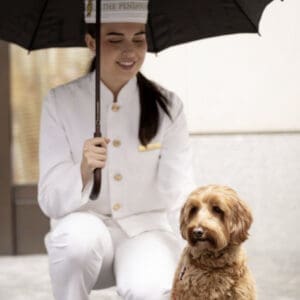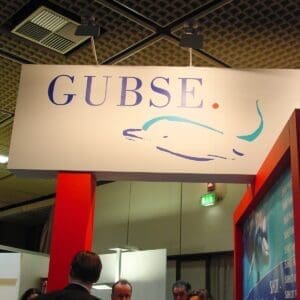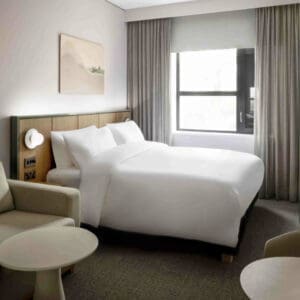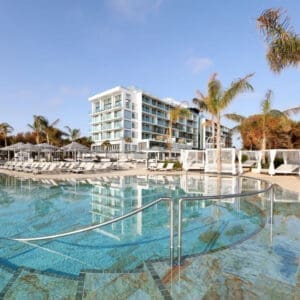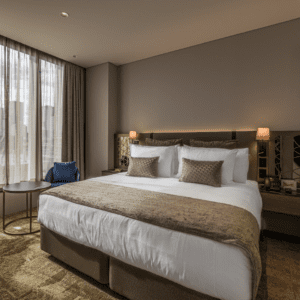 Millennials are nearly twice as likely to want to travel more for business than Baby Boomers (45 percent to 26 percent, respectively), and a strong majority of Millennials (57 percent) believe technology can never replace face-to-face meetings to get business done.
Millennials are nearly twice as likely to want to travel more for business than Baby Boomers (45 percent to 26 percent, respectively), and a strong majority of Millennials (57 percent) believe technology can never replace face-to-face meetings to get business done.
Additionally, Millennials are far more likely to rely upon social media to meet up with friends when traveling than Baby Boomers (46 percent to 17 percent) and are far less likely to want to use their personal credit cards to float business expenses (53 percent to 69 percent). In terms of travel amenities, if only one could be selected, Baby Boomers would strongly prefer to pay no fee to check bags (47 percent compared to 34 percent of Millennials), while Millennials want free Wi-Fi (30 percent compared to 17 percent of Baby Boomers).
These findings come from the latest GBTA Business Traveler Sentiment Index™ – research from the GBTA Foundation, the education and research arm of the Global Business Travel Association (GBTA), in partnership with American Express.
“Millennials are the newest generation of road warriors and, like their more experienced peers, they understand that face-to-face meetings remain key to getting business done,” said Michael, W. McCormick, GBTA Executive Director and COO. “Over the last quarter, business travelers across the board – Millennials, Gen Xers and Baby Boomers – reported that their goals were met on business trips, leading to greater satisfaction.”
“Millennials in particular are interested in business travel and see the value it brings to their companies and their careers,” said Susan Chapman-Hughes, Senior Vice President, American Express Global Corporate Payments. “This generation may see more upsides to business travel because they’ve found new ways to stay connected to their personal and professional commitments while on the road.”
The study also found that overall business traveler satisfaction with getting through airport security declined significantly in the past three months (from 55 percent in Qtr2 to 45 percent in Qtr3). Despite this drop, overall satisfaction levels with the business travel experience remain high (73 percent). But with airplane travel as a driving force in overall satisfaction, a continued downward trend could have an increasingly negative impact.
Older travelers say smooth sailing through security trumps amenities
Given a choice, business travelers overall prefer getting through security easily (52 percent) to other airport amenities, however, smoothly getting through security is much more important to Baby Boomers (59 percent) and Gen Xers (56 percent) than to Millennials (35 percent). While almost one-half (48 percent) of business travelers want free Wi-Fi at the airport, this is more important to Millennials (54 percent) than Baby Boomers (44 percent). Additionally, regardless of age, two in five business travelers (39 percent) want airports to offer non-stop flights to their destinations.
Additional key findings
- A concern raised in the study centers around confidence in the economy. The percentage of travelers who believe the overall health of the economy is excellent dropped from 32 percent in quarter two to just 21 percent this quarter. This is despite the fact that travelers’ views of the health of their own company or industry remained virtually unchanged and much more positive. More than half of business travelers feel their own company is in excellent financial shape (62 percent) and that the overall health of their industry is excellent (51 percent).
- Travelers don’t want passengers to talk on mobile phones while in flight. The study finds that nearly two thirds of business travelers oppose allowing passengers to talk on their mobile phones while a flight is in the air, while just 9 percent support this.
- The GBTA Business Traveler Sentiment IndexT, in partnership with American Express, experienced a significant decline — 3.7 percentage points —from Wave 2 (98.7) to Wave 3 (95.1) of this research. A decline in the Index means the overall trip experience for business travelers has worsened, which may partially reflect concerns about the overall economy, as well as other challenges with the travel experience.
About the Index
The GBTA Business Traveler Sentiment Index™, in partnership with American Express, is a proprietary, data-centered barometer based on business travelers’ attitudes toward seven key components of business-related travel:
Index Components, in order of impact on overall GBTA Business Traveler Sentiment Index, in partnership with American Express:
- Overall Trip Experience and Travel Friction – Business travelers’ attitudes toward air travel, hotel stays, and ground transportation.
- Expense Tracking and Management – Satisfaction with business travel expense management and tracking, and using credit or charge cards for business travel.
- Travel Management Policy Friction – Attitudes toward company travel policy management, flexibility and comprehension.
- Business Travel Safety – Looks at how safe business travelers feel when traveling and to what extent their employers, travel suppliers, and security officials care about their safety.
- Corporate/Macroeconomic Environment – Feelings about the current state of the health of the economy, the companies travelers work for and their industries.
- Technology for Business Travel – Opinions about technology’s impact on the business travel experience.
- Social Media Experience – Attitudes toward using social media while traveling for work, including finding or posting reviews of travel suppliers.
For the GBTA Business Traveler Sentiment Index™ – At a Glance executive summary, please click here.
To purchase the full GBTA Business Traveler Sentiment Index™, please click here.
The GBTA Business Traveler Sentiment Index™, in partnership with American Express, fielded June 22-30, 2015 to business travelers within the U.S. through an online research panel. Overall, 845 respondents qualified for the study (their primary residence is located in the United States, they are employed part- or full-time, and they have taken four or more business trips in the prior 12 months). The margin of error is +/- 3.4 percent at the 95 percent level of confidence.




